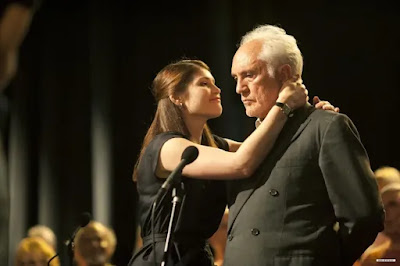Song for
Marion (PG) 93 mins ***
Cloud
Atlas (15) 172 mins ****
Cinema’s biggest growth area in the wake of The King’s Speech has been matinee fare:
films aimed at older viewers keen to avoid teenage texters and get home by a
reasonable hour. These grey-pound grabbers have varied in their content – Judi
Dench’s sudden prominence arguably made Skyfall
part of the cycle – but they’ve largely inhabited the same stifling tonal
range: somewhere between cute and cosy, as though the target audience were
incapable of processing anything challenging at 2pm on a wet Wednesday,
preferring to be tickled under the chin for ninety minutes.
The one surprise with Song for Marion, which
otherwise fits the template squarely, is who’s holding the tickling stick:
writer-director Paul Andrew Williams, whose tough genre experiments London to Brighton and Cherry Tree Lane preferred taking
baseball bats to everybody’s heads. Maybe it’s opportunism, maybe Williams is
mellowing with age: either way, his latest plays like an update of the
time-honoured Full Monty formula –
public exhibitionism vanquishes English emotional reserve – for a post-Glee world. (The documentary Young@Heart may also have been an
influence.)
Its central conflict is established during the
opening credits. Terence Stamp’s grumpy Arthur, weighed down by the heaviest of
overcoats, is trudging joylessly through his housing estate; he’s off to pick
up happy-clappy wife Marion (Vanessa Redgrave) from her weekly date with a
pensioner acapella group known as “The OAPz”. Marion, we will learn, has a
tumour to go with the tunes inside her head, giving the plot its mild momentum:
the question is whether the music can get the terse, socially awkward Arthur
(“you know how I feel about enjoying things”) to open up before it’s too late.
Where Williams’ earlier films possessed the grim
urgency of midnight movies, here he defaults to the look and feel of afternoon
TV: all that’s missing are the ads for walk-in baths. The pitch is somewhere on
the level of Pensioners Do (And Sing) The Funniest Things. As Gemma Arterton –
whose too-sweet-to-be-true vocal coach really ought to be named Miss Honey or
Miss Virtue or something – guides the oldtimers through a toe-tensing rendition
of “Let’s Talk About Sex”, some may feel that Arthur’s crotchety demeanour is
entirely reasonable.
Yet this kind of community-centre cinema is
dependent more than most on who shows up, and here Stamp proves Williams’ trump
card. Rarely sounding a false note, he’s often seen willing the material past
its own limitations: one off-screen howl of regret comes as both unexpected in
a film so determinedly peppy and strangely, suggestively musical. After that,
we’re but a song away from an understated finale: Arthur, repositioned centre
stage to croak Billy Joel’s “Lullaby” while a single tear trickles down Stamp’s
skull-like features. Extraordinary thing, the potency of cheap music.
Mitchell’s unifying theme of freedom inspires the
film’s most rewarding tactic: disguised in latex, the actors escape into
multiple selves. Having relocated his sense of fun in voicing Aardman’s The Pirates!, Hugh Grant re-emerges in
costume as, variously, a chauvinist nuclear bigshot and a post-apocalyptic
people-eater. Tom Hanks and Halle Berry require rather more make-up to disguise
the fact they are, well, Tom Hanks and Halle Berry, but the dual roles of
cranky composer and fugitive publisher provide further illustration of Jim
Broadbent’s unflashy virtuosity.
It’s a bold gamble – something like the most
transcendental showreel ever filmed – and not every strand goes places: the
fall of mankind, involving Hanks and Berry plodding round forests swapping
mumbo-jumbo dialogue, is a destination that never quite lives up to the
journey. Still, it’d be a dull soul who didn’t respond to the risks the film
takes, the boundaries it pushes, and the resonances it finds between disparate
lives. How a vision this brazenly eccentric snuck past the Warner Bros.
beancounters is a mystery, and something to be amazed by in itself, but its
dreamy peregrinations will almost certainly account for the season’s most
daring and adventurous release.
Song for Marion and Cloud Atlas are now playing in cinemas nationwide.

No comments:
Post a Comment